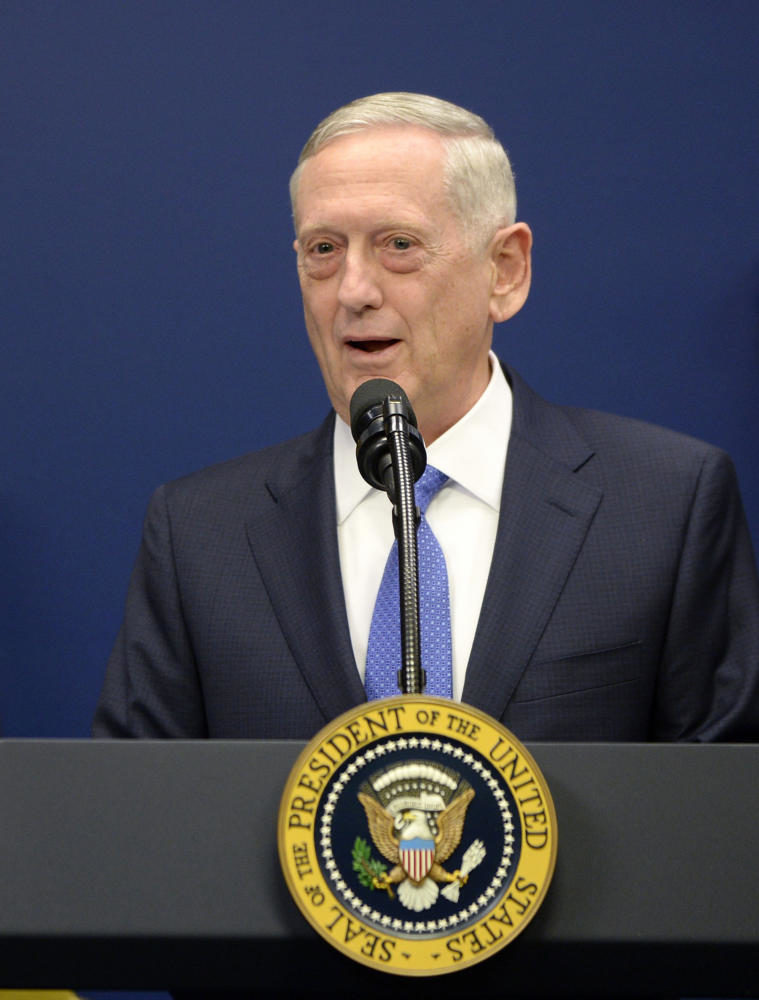Mattis says N. Korean missile launch toward Guam could quickly ‘escalate to war’
Secretary of Defense James Mattis speaks in the Hall of Heroes at the Department of Defense Friday, Jan. 27, 2017 in Arlington, Va. Mattis said Monday that if North Korea carried out its threat to launch missiles toward Guam, it could escalate to war. (Olivier Douliery/Abaca Press/TNS)
August 14, 2017
WASHINGTON — Defense Secretary James N. Mattis warned Monday that if North Korea carried out its threat to launch missiles toward Guam, a U.S. territory in the western Pacific, it could escalate to war.
“If they fire at the United States it could escalate into war very quickly,” Mattis told reporters at the Pentagon. “That’s called war, if they shoot at us. … You don’t shoot at people in this world unless you want to bear the consequences.”
Mattis cited a classic Hollywood political satire about nuclear war to say he wasn’t drawing red lines or making idle threats to spark a confrontation.
Advertisement
“It’s not declaring war — it’s not that I’m over here, Dr. Strangelove, doing things like that,” he said.
North Korea tested an intercontinental ballistic missile last month for the first time, and U.S. intelligence agencies assess that Pyongyang can build a nuclear warhead small enough to fit atop a long-range missile, although it’s not clear if it can target U.S. cities.
The latest missile tests led to a sharp rise in tensions. The United Nations Security Council voted unanimously to add new sanctions on North Korea and President Donald Trump warned he would unleash “fire and fury” if Pyongyang continued its threats.
This week, North Korea said its autocratic ruler, Kim Jong Un, had reviewed a plan to fire four midrange missiles over Japan and into international waters at least 20 miles off Guam, where the U.S. military operates several major bases.
Mattis said a North Korean missile hitting the U.S. territory, or the continental United States, is an act of war and will almost certainly trigger a U.S. military retaliation.
He was ambiguous as to how Washington would respond if Pyongyang launched a missile toward Guam as a show of force, and it landed far offshore.
“War is up to the president, and perhaps up to Congress,” Mattis said. “The bottom line is we will defend the country from attack.”
Advertisement*
The U.S. military would be able to determine if a North Korean missile is headed toward Guam “within moments,” he said, because of spy satellites, radars and other high-tech sensors that track missile launches.
If necessary, “we’ll take it out,” Mattis said, suggesting the U.S. military would attempt to shoot it down with anti-missile interceptors on land and ships.
“Hear me now, we will defend the country from any attack at any time from any quarter,” he said. “Yes, that means for a lot of young troops they’re going to be in a wartime situation. Welcome to reality.”
Earlier, Mattis and Secretary of State Rex Tillerson sought to defuse tensions in a Wall Street Journal op-ed that said the Trump administration does not seek “regime change or accelerated reunification of Korea,” issues of special concern to China, which supports Pyongyang.
Gen. Joseph F. Dunford, chairman of the Joint Chiefs of Staff, arrived late Monday in Beijing to meet with Chinese military leaders. Earlier, he met with South Korea President Moon Jae-in at Osan Air Base, a U.S. Air Force base about 40 miles south of Seoul.
Dunford said in Beijing that his goal is to “continue to develop our military-to-military relationships, to mitigate the risk of miscalculation in the region and to have cooperation where those opportunities exist,” according to a Pentagon statement.
___
(c)2017 Los Angeles Times
Visit Los Angeles Times at www.latimes.com
Distributed by Tribune Content Agency, LLC.
Advertisement








